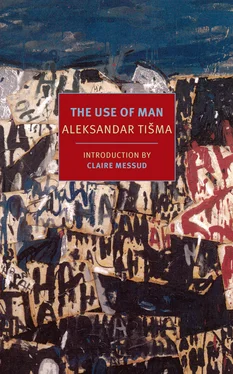Aleksandar Tišma - The Use of Man
Здесь есть возможность читать онлайн «Aleksandar Tišma - The Use of Man» весь текст электронной книги совершенно бесплатно (целиком полную версию без сокращений). В некоторых случаях можно слушать аудио, скачать через торрент в формате fb2 и присутствует краткое содержание. Год выпуска: 2014, Издательство: NYRB Classics, Жанр: Современная проза, на английском языке. Описание произведения, (предисловие) а так же отзывы посетителей доступны на портале библиотеки ЛибКат.
- Название:The Use of Man
- Автор:
- Издательство:NYRB Classics
- Жанр:
- Год:2014
- ISBN:нет данных
- Рейтинг книги:5 / 5. Голосов: 1
-
Избранное:Добавить в избранное
- Отзывы:
-
Ваша оценка:
- 100
- 1
- 2
- 3
- 4
- 5
The Use of Man: краткое содержание, описание и аннотация
Предлагаем к чтению аннотацию, описание, краткое содержание или предисловие (зависит от того, что написал сам автор книги «The Use of Man»). Если вы не нашли необходимую информацию о книге — напишите в комментариях, мы постараемся отыскать её.
A work of stark poetry and illimitable sadness,
is one of the great books of the 20th century.
The Use of Man — читать онлайн бесплатно полную книгу (весь текст) целиком
Ниже представлен текст книги, разбитый по страницам. Система сохранения места последней прочитанной страницы, позволяет с удобством читать онлайн бесплатно книгу «The Use of Man», без необходимости каждый раз заново искать на чём Вы остановились. Поставьте закладку, и сможете в любой момент перейти на страницу, на которой закончили чтение.
Интервал:
Закладка:
While the proprietor took his father upstairs, Sredoje found an empty chair at a corner table next to a man who was half asleep. It wasn’t until he sat down and leaned against the back of the chair that he felt how tired he was; his whole body throbbed. The proprietor came back, looked for Sredoje, and walked over to him. “I only have beans, but they’re good.” Sredoje nodded. The food arrived, and he threw himself at it, savoring the warmth and flavor of each spoonful he swallowed. After polishing his plate and drinking his fill of water, he slumped back in his chair, covered with sweat. The proprietor lit a kerosene lamp behind the counter (evidently there was no power), and the customers, as if at a prearranged sign, began to leave. Even the man at Sredoje’s table came to life, got up, and hobbled off.
But several guests stayed on at the middle table, gathered around the two German soldiers. The soldier who sat facing Sredoje, a fair-haired, middle-aged man, took out of his jacket pocket letters, photographs, cigarettes, and a penknife, and displayed them to those assembled, precisely pronouncing the German words for each— meine Frau, mein Sohn, meine Tochter, Deutsche Zigaretten, Taschenmesser —as if introducing them to parts of himself in order to become closer to them, to be better understood. The locals — one a dark, stout, older man in a worn suit, another bony, with close-cropped hair, and another wearing a hat, his mustache drooping — obediently observed these objects, nodding, and with smiles described to each other in Serbian what they saw, as if it were something of great value and importance. Then they in turn, poking their thumbs at their chests, gave their own names and professions. The stout man was a barber, and as proof he produced a razor from the top pocket of his coat; the man with the close-cropped hair was a leather worker; and the one with the hat and the drooping mustache was a cobbler. All had their businesses on the main street, they informed the German, calling him over to the door and pointing, after a few misunderstandings, to their shops.
When it seemed that subject was exhausted, the German beckoned them to the table; the proprietor, too, approached. Then the German took out a pack of cards and, grinning at his own cleverness, started to cut and shuffle with the fingers of one hand. He laughed, showing a row of metal teeth; everybody else laughed, too, except for Sredoje, whose eyes were too tired to watch the lightning movement of the brightly colored, smooth surfaces of the cards. His head ached, so he got up, left the laughter and exclamations of approval, and went up the stairs. At the top he found a half-open door to a little room and in the dimness recognized his father on the only bed. Sredoje undressed and lay down next to him. His father sighed, “My Rastko, my Rastko,” let out a moan, then continued snoring fitfully. For a long time Sredoje was kept awake by his headache and the laughter from the room below, which now and then exploded into roars of mirth.
The following morning he was again awakened by shouts from below. He opened his eyes and saw his father sitting on the bed, barefoot, staring into space, fingering his three-day growth of graying beard. “Poor wretches that we are, my son,” he muttered, shaking his head. They got up, dressed, and went downstairs.
Sredoje saw the same faces he had left the night before: the barber, the proprietor, the leather worker. Only the Germans and the cobbler were gone. He said to his father, “That dark-haired man is a barber. We’ll ask him to shave you.” But the proprietor, who had overheard, laughed loudly. “Shave you! Don’t you know? They cleaned us out!” That started the rest of them talking, interrupting each other: their shops had been broken into and looted; everything that could be taken had been taken, everything.
“Even our razors and scissors,” said the barber in disgust. “Our needles, too,” said the leather worker. “All the bottles, glasses, all the money from the till,” said the proprietor in despair. But the thief was not named.
Nemanja Lazukić, unaware of the Germans the night before, asked what had happened, but the only answer was a dismissive wave of the hand. The talk of possessions disappearing prompted him to inquire about the suitcases Rastko had with him in the military cart: Had anyone seen them? Had the soldiers who brought in the body? But no one knew anything about the suitcases or the soldiers.
“There’s no hope at all,” the proprietor told him. “Since this morning they’ve been taking the soldiers away, and your men are probably among them.” For breakfast, all the proprietor could serve was sherbet and bread. “I couldn’t give you anything else if you killed me,” he growled. “They even took my coffee. I don’t know how I’m going to feed my family.” But after breakfast he invited Lazukić and Sredoje into the cold kitchen, where he let Lazukić shave with his razor.
Once in the street, Lazukić and Sredoje saw a group of Yugoslav soldiers, without rifles, walking two by two, escorted by armed Germans. The local people stood on the sidewalk, watching this silently, solemnly, but with no sign of life in their eyes. No one paid attention to Lazukić and his son anymore; it was as if they had been absorbed into the occupied and looted town of Ub. They went to see the priest.
They found him in front of his house, without his surplice, in trousers and an old coat, feeding the chickens. They barely recognized him. He did not put down the basket filled with maize or ask them into the house; he simply accepted the money that the lawyer put into his free hand and nodded.
“Will you look after the grave, please, until I am able to do so myself?”
“I will, I will,” replied the priest, turning to the chickens, who were piping impatiently around him.
They went out to the cemetery and found it deserted, not a single visitor. Lazukić wept before the fresh mound, caressed the cross, which bore no inscription. “We’ll come back soon, we will,” he whispered. Then they walked back into the town.
At the inn they asked the proprietor over to an empty table to consult him on how to proceed with their journey. Confidentially, as if they were his own family, he told them all he knew: the roads were jammed, the Germans were looting and capturing Yugoslav soldiers stranded on the roadsides, and prices were astronomical.
“Any news about Belgrade?” asked Lazukić.
“They say Belgrade’s been razed.”
The lawyer flinched. “But where can we go to, other than Belgrade? I have a good friend there who will take us in.”
“Why don’t you go home?” the proprietor suggested, blinking at them from beneath his impressive eyebrows.
“Home? Never!” Then Lazukić qualified the refusal: “At least for the time being, until we hear what’s going on there. But help us find a cart to take us to Belgrade. I feel so weak after all that has hit me that I can’t go on foot.”
The proprietor promised to do his best. He gave them lunch, despite what he had said earlier about having nothing: beans, perhaps from the same pot from which Sredoje had been served the night before. They spent the afternoon in the inn, listening to idle talk, until they were bored to tears, and to bickering, to rumors of looting and battles “down south,” where it was said that the main force of the army had remained intact. In the late afternoon the proprietor brought a well-fed young man to their table, who downed two brandies at Lazukić’s expense before agreeing to come with his cart the next morning. They went to bed.
In the morning, when they looked out the window of their room, they saw a fine, light sleet falling on roofs and streets. They went downstairs, drank some sherbet, and waited. Their driver was not to be seen. Lazukić paced impatiently to the door and back, asking the proprietor question after question, while the latter tried to calm him: Yes, the man would come; for the money he was promised, he would not let them down. And indeed, suddenly the driver appeared at the door in rubber boots, holding a whip. “Where are those people bound for Belgrade?” he shouted. “Let’s go, we must hurry!”
Читать дальшеИнтервал:
Закладка:
Похожие книги на «The Use of Man»
Представляем Вашему вниманию похожие книги на «The Use of Man» списком для выбора. Мы отобрали схожую по названию и смыслу литературу в надежде предоставить читателям больше вариантов отыскать новые, интересные, ещё непрочитанные произведения.
Обсуждение, отзывы о книге «The Use of Man» и просто собственные мнения читателей. Оставьте ваши комментарии, напишите, что Вы думаете о произведении, его смысле или главных героях. Укажите что конкретно понравилось, а что нет, и почему Вы так считаете.












